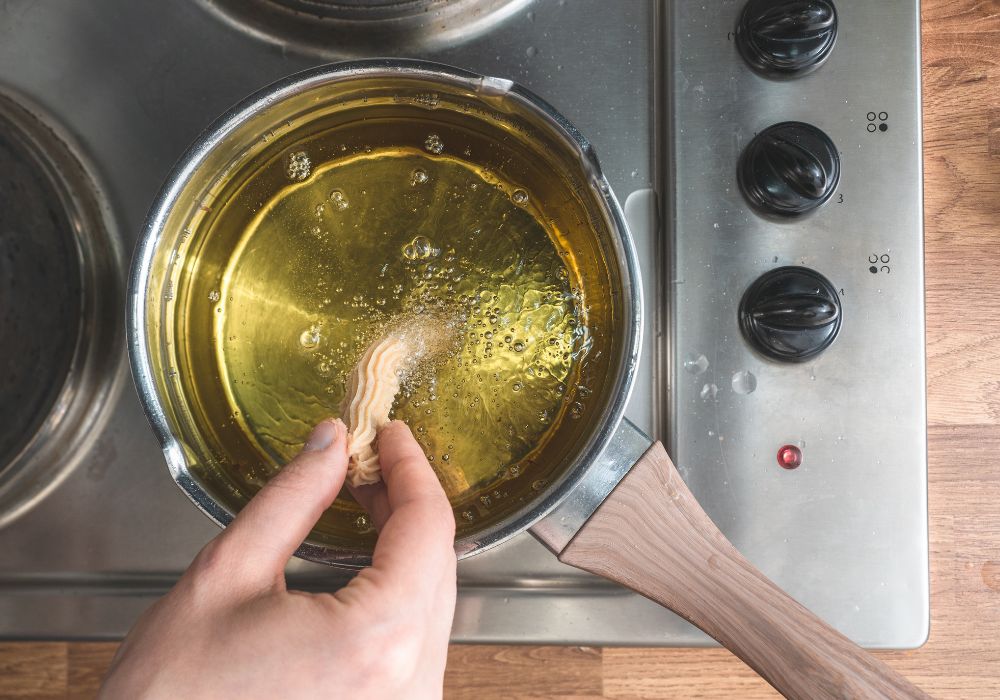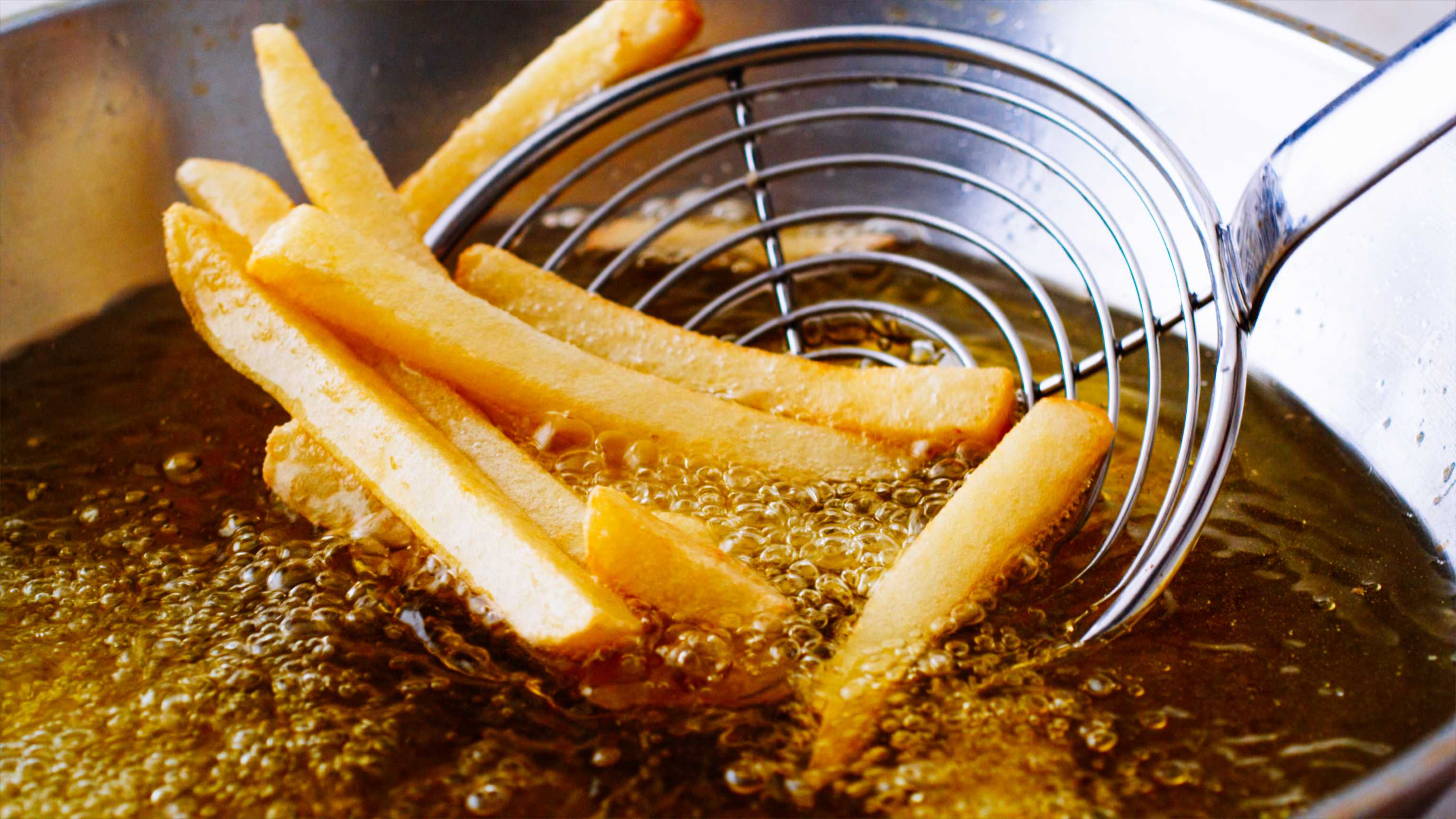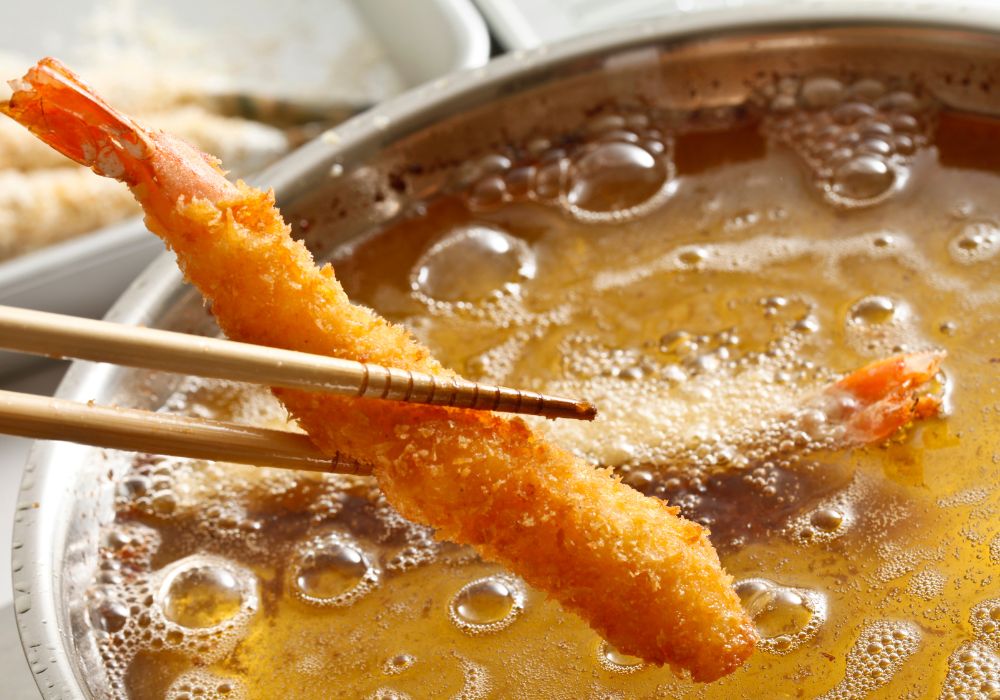Although deep-fried dishes are golden, crispy, and delectable, many cooks, even seasoned ones, frequently use the incorrect cooking oil for deep frying. As a result, they may wind up with burnt or ill-tasting meals, a smoky kitchen, and, depending on the sort of oil they purchased, a depleted bank account.
Deep frying has unique challenges, as opposed to other uses, like baking, preparing a salad dressing, or even sautéing, where you can frequently get away with using any oil you please. Let’s take a look at the factors that go into choosing oil for deep frying, and why we think Palm oil is the best oil for deep frying your food.
Understanding cooking oil: smoke points
Selecting an oil for deep frying with a suitable smoke point is the key challenge. Cooking oils and fats respond to heat in various ways, but generally speaking, the hotter it is, the more they deteriorate and finally begin to smoke.
That implies that some oils for deep frying are superior to others. The smoke point of an oil refers to the temperature at which it will begin to smoke. An oil with a high smoke point such as Palm oil may be heated to a high temperature before it begins to smoke.
Your meal will taste burned if you cook with oil that has been heated past its smoke point. Additionally, if you heat your oil past its smoke point, a fire can occur. It is very important to understand smoke points when deciding on which oils to use on different foods as not all foods cook at the same temperatures, and for the same amount of time. Your smoke point typically needs to be higher than the cooking temperature of your food. Refined oil is a better choice for deep frying than unrefined oil as it has a high smoke point and doesn’t impart flavour to the food.
Most common cooking oils and how to use them
Palm oil for deep frying
Palm oil is an edible vegetable oil that comes from the mesocarp (reddish pulp) of the fruit of the palm tree. It is more often than not the best oil for deep frying as it consists mostly of saturated and monounsaturated fats and has a high smoke point. Palm oil generally has a neutral flavour and will not give any flavouring to the food that you are frying. While Palm oil is one of the best options for deep frying, always make sure that you are using sustainably sourced palm oil.
In general, vegetable oils such as Palm oil are one of the better and healthier options for deep frying, as it is not only vegan friendly, but also, have a much higher smoke point than animal fats which are usually unrefined and have shorter chained fatty acids than vegetable oils. Something to be aware of when you are shopping for vegetable oil is that bottled vegetable oil in supermarkets is usually just rapeseed oil also known as Canola.
Olive oil for deep frying
For the majority of shallow-frying demands, olive oil is a fantastic choice as it is one of the healthiest oils for frying. It is better suited for tasks like sautéing vegetables or pan-frying thin slices of meat since it has a lower smoke point (about 190°C) than some of the other oils. Remember that it doesn’t taste neutral, and it will give your food some flavour. We don’t recommend using virgin olive oil for deep frying because it is unrefined and therefore has a low smoking point. Instead, only refined olive oil should be used for deep frying.
Canola oil for deep frying
Canola oil (rapeseed oil), like vegetable oil, is a cooking oil with a neutral flavour that is extremely adaptable. It works well for all types of frying, but it also roasts vegetables well and makes a tasty dressing. Canola oil has a good smoke point for deep frying at roughly 204 °C, most deep-fried meals require an oil temperature of between 162 and 190 °C. Canola oil is also relatively inexpensive and can be found almost anywhere.
Groundnut oil for deep frying
Groundnut oil is comparable to vegetable oil in that it has a high smoke point (about 230°C) and is useful for a variety of purposes. Deep-frying is very common using groundnut oil. Groundnut oil might be a terrific alternative if you’re creating a deep-fried meal that asks for vegetable oil and you’re running out. Remember to check the allergen status of the groundnut oil: crude groundnut oil will contain allergenic material.
Coconut oil for deep frying
Coconut oil is a fantastic alternative for pan-frying and sautéing veggies. However, it’s not the best oil for deep-frying. Smoke points for coconut oil range from 176 to 204°C and is typically quite expensive. Although refined coconut oil has a higher smoke point than unrefined coconut oil, it is still not a good choice for deep frying as its smoke point is lower than other more suitable deep frying oils such as palm oil.
Healthiest oils for deep frying
Another factor you might consider is whether a given cooking oil is more or less healthy. The good news is that most cooking oils are healthy for you as long as they are liquid at room temperature. Your decision will thus mostly depend on how healthy you want to be.
The ratio of polyunsaturated fats, which are the so-called “good fats” which raise HDL (the “good” cholesterol), reduce LDL (the “bad” cholesterol), and have a relatively low amount of saturated fats, which are the so-called “bad fats” determines what the healthiest oils for deep frying are.
Palm oil contains no cholesterol or trans-fats and is one of the healthiest options for deep frying. Palm oil is heat stable and has a high smoke point, and is therefore more resistant to break down and oxidation during deep frying. Because the physical properties of Palm oil are better preserved, fat absorption by the food is reduced. It also contains tocotrienol which is a rare form of vitamin E that has powerful antioxidant properties.
Which types of oils best suit which types of foods for deep frying?
Deep-fried food doesn’t have a reputation for being a healthy food option. Eating too much of it cooked in the wrong oils can lead to health problems. That is why it is so important to understand your oils, their smoke points, and what they should be used for. Deep frying foods in the wrong oil can leave your food burned and greasy so make sure you know which oil should be used for various foods.
Chicken and other meats
Opinions differ because different people like using lard, oils, or a combination of the two. Utilizing a product with a high smoke point is crucial (meaning that it can be heated to a high temperature without burning). These oils include palm oil, canola oil, and groundnut oil. Olive oil and butter both have low smoke points, so avoid using them. You should be sure to reheat the oil between batches since the optimal temperature for frying chicken is between 175 and 185 °C.
Chips and other carbs
Because it has a high smoke point that enables the fries to cook effectively with great crispy edges, Palm oil is perfect for deep frying chips and other carbs. The high smoking point of Palm oil also makes it safe to be used repeatedly without losing quality. Another advantage of using Palm oil for deep frying chips and other carbs is that it has a neutral flavour and will not add any flavour to the food you are frying.
Doughnuts and other desserts
Generally, the best oils for deep frying doughnuts and other desserts are the oils with the least flavour and a high smoke point. Palm oil is one of the best oils to use for deep frying doughnuts as it has a high smoke point and does not impart any flavour to the food that is being fried. The saturated fat content in Palm oil also aids the adhesion of powdered sugar, glazes or other toppings.
Cost of oil for deep frying
There is the issue of cost, oils are expensive for deep-frying since you might be using anywhere from two to eight cups of oil at a time. And yes, you can reuse your oil, but that’s still quite a lot of oil to buy as an up-front expense.
Refined sunflower oil, rapeseed oil and palm oils are good choices health-wise and also in terms of their smoke points, they are also much cheaper than many other, more exotic, less frequent cooking oils like avocado oil, coconut oil, and groundnut oil.
Frymax palm oil – the oil of choice for deep-fried perfection, every time
Frymax is the UK’s largest supplier of frying oil to fish and chip shops and other food outlets and restaurants since 1954. And our oil doesn’t just give you the best results every time you heat up the frying pan, it’s the best choice for sustainability too. Since 2013, Frymax oil has been made from fully-segregated, RSPO-certified palm fruit oil. Not a drop of non-certified oil goes into the production of Frymax. Home cooks and restaurateurs can rest assured that, when they choose Frymax, they are supporting sustainable, ethical palm oil production. For more information don’t hesitate to get in contact with the helpful Frymax team.
Become a Frymax member today to gain access to exclusive content, expert frying advice and the chance to enter our fantastic competitions.






